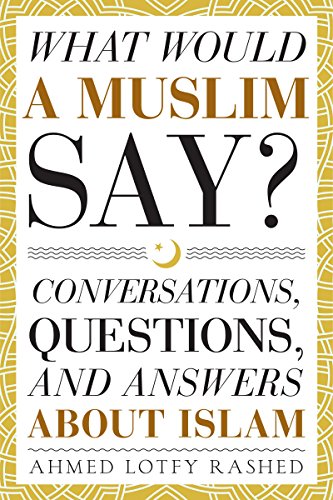
Religion and Spirituality/Islam
156 pages
Subtitled ‘Conversations, Questions, And Answers About Islam’, this slim volume is an introduction to the Muslim’s view of Islam. It’s also an attempt to separate the actions of extremists from the doctrines on which they base those actions. And an effort to educate non-Muslims in the way the religion is supposed to work.
I was approached by the author to review the book with an offer of a free copy for this purpose. When I explained that I’m an anti-religious agnostic and would produce an honest review from that standpoint, he nevertheless wanted me to go ahead.
Having read the Qur’an in translation, and found it both repetitious and boring, I was curious about how it might be interpreted by a committed Muslim. In common with most religious adherents, the author answers all questions solely in the context of his chosen religious script. Christians generally rely on the Bible for their arguments about Christianity, Buddhists use the Sutras, Hindus quote the Vedas, Jews employ the Talmud, and of course, Muslims depend on the Qur’an. I recognise those religions have other sources of inspiration and authority, but these are their main supports. And, yes, I’ve read the whole tedious pantheon, unsuccessfully seeking the inspiration clearly encountered by adherents.
Some of his questioners are clearly antagonistic, some are genuinely curious, some are considering conversion, and some are Muslims seeking clarification.
The author attempts to correct false impressions and directs enquirers to the real beliefs of Islam. There’s much justified rage in the world regarding terrorism. Such anger is understandable but does little good if directed at the wrong source. The author tries to explain what a proper Muslim should feel and believe in any given situation, and does this calmly, and without rancour, despite harsh words from some correspondents.
The book contains links to various Muslim resources that the author explains will clarify and/or support his answers. He’s been scrupulously fair in his treatment of the conversations he includes, presenting them in their complete form, and ending them as they ended on the site where they were first compiled. So, the book answers questions, from a variety of sources, through the eyes of a devout Muslim attempting to correct false impressions imposed by radical actions and the response of the gutter press to such acts.
It also reinforces the idea, central to Islam, that the word of God is exclusive to Arabic and can only be properly understood in that tongue. All translation is an approximation and misses subtleties the original expresses, thereby excluding the vast majority of the world’s population. As to why an omnipotent and omniscient deity would use such a relatively obscure language to convey a worldwide message, there’s no clue. And how the pilgrims’ repetition of prayers made in a tongue unknown by most adherents can have any real meaning in terms of faith remains equally unaddressed, though he does explain that this repetition is material in maintaining the original words of the Qur’an in a word-of-mouth handed-down tradition.
What this book won’t, and can’t, do is help people understand why acts of terrorism are committed in the first place. Because it stems from a point of belief in an ambiguous set of tenets, the book can only provide answers corresponding to the faith expressed in those doctrines.
We’re left with the implied conclusion that terrorism committed in the name of Islam is, more properly, the result of a combination of tradition, culture, repression, unfulfilled wants, injustices, inequalities, and Islam as taught through these filters rather than as intended. With all religions, of course, the simple fact of their existence allows extreme adherents a platform from which to justify their violence and indiscriminate destruction of life. Religion almost always results in forms of tribalism that inevitably lead to division and conflict.
All religious writings have some merit. But all are also divisive due to their ambiguous nature. If there were a god, and that entity decided to provide humankind with a guide to required behaviour, surely the most obvious and essential quality to such a guide must be that it be incapable of misinterpretation. All religious scripts I’ve encountered are subject to interpretation, and therefore to misinterpretation: so, they cannot be the word of god, only the words of men determined to impose their own views on the rest of the world. I could continue in this vein, expressing my personal reasons for my anti-religious fervour, but this is a review of a specific book, so I’ll desist.
The constant temptation to diverge from the act of review of this book made this the most difficult evaluation I’ve ever made. And, because of that difficulty, I’ve rewritten this short piece several times. I’m aware what I’ve written here may hurt, disappoint, enrage and/or confound some readers. It’s just possible, however, that it may also encourage others to analyse their own approach to faith, in whatever religion, and examine it through the rational filter of reason. It remains my honest view of the book, an opinion of one individual; no more and no less. And it’s written in the hope of encouraging individual thought rather than reliance on the judgments of others.
#
[Any review is a personal opinion. No reviewer can represent the view of anyone else. The best we can manage is an honest reaction to any given book.]
Personal note: I anticipate a reduction in followers here and on social media sites following the posting of this review. Many religious people are hypersensitive about their faith and consider even the least offensive and most thoughtful criticism of their beliefs an affront to them and their god, as though any deity worthy of the name would give two hoots about the opinions of nonbelievers. I’ll be sorry to lose followers, but I value truth and honesty more highly than I do political correctness designed to prevent genuine discussion of vital topics.



Thank you for the post, Stuart. Allow me please to mention quick points if you don’t mind. There are bad Muslims. I call most of them pretenders or ignorant because, as a Muslim and a Syrian, I know that terrorism isn’t part of Islam at all. I don’t know the author of this book (or his intentions) nor did I read his book. However, the post above contains many mistakes that are either because of the book itself or because of a misunderstanding from the reviewer!
Simply, one has the right to choose whatever beliefs s/he likes. There is one condition though: Don’t kill others, mock them, or cause them harm in the name of your God or Belief.
Because I have many Non-Muslim friends, I’m not offended by this review as we have similar discussion a lot. I also made a simple introduction about Islam here:
LikeLiked by 1 person
Thanks for your comment, Mohamad. The author says exactly that, ‘There are bad Muslims’. He belongs to an online organisation, WhyIslam.org, that attempts to answer Islam-related questions.
I’d be interested in the ‘mistakes’ in the review, as I always attmept to write honest reviews of any book I read, so please, let me know.
I agree with you that people have the right to believe what they like. How one responds to those beliefs is always a personal choice, of course. And, as a rational individual, I can’t help but encourage people to believe in those things for which there is evidence rather than those things that depend on legend or myth. Stories are wonderful: I write them myself, but it’s vital we know the difference between fantasy and fact, isn’t it?
LikeLiked by 1 person
Sorry for delay, Stuart; and thank you for your detailed reply. Well, here are some points that got my attention in the post:
We’re talking about the God. The One who created everything and all nations – not only Arabs. The language of the Holy Book of Islam (Quran) is Arabic. It’s normal then that understanding Arabic well will ensure better enjoying and understanding of this book. Unless it’s very difficult (for non-Arabs of course), only very few things in Islam are required to be done in Arabic language.
In general, there are basics for everything; discussing the details beyond basics might be endless.
LikeLiked by 1 person
Time, Mohamad; we all struggle to find it, and have many other things to deal with than commenting online, so no need to apologise for the delay here.
Religion is, by its very nature, divisive. You see, you are talking about ‘the God’, as that is the way you see it from your point of view. I, however, who don’t believe in any god, am talking about a fictitious entity called God invented by men to satisfy some need. We are bound, therefore, to disagree.
On the Arabic issue, our daily experience, here in the UK, is that Muslim schools insist on their pupils reciting the Qur’an in Arabic, even if they don’t understand the language. This is a custom that is seen all over the Muslim world. My point is that parroting sounds (language) that are not understood by the person making those sounds is a pointless and meaningless exercise, and one I cannot understand as a method of worship. After all, if you don’t know what it is you’re saying, you could be actually insulting the very entity you’re intending to praise: it all depends on the honesty, or deceit, of the person leading such activity. And we all know there are bad teachers as well as good.
As you rightly point out, there are basics underlying almost everything, and nowhere is that truer than with religions, of which there are thousands. So, yes, discussing such basics would be an endless mission.
I suspect the best we can do is accept we have different points of view. You are a Muslim, steeped in the lore of the Qur’an. I am an ex-Christian whose study of other religions and science has brought me to the view that the existence of a god is at best questionable: I’m an agnostic. I think we’ll have to agree to differ.
LikeLiked by 1 person
Difference is an important component of this life. Of course, we should respect it. I’m honored and pleased to have this discussion with you, my friend.
LikeLiked by 1 person
And I with you, Mohamad. It’s good when different viewpoints can be discussed calmly and without rancour.
LikeLiked by 1 person
To be honest, Stuart, I doubt any Muslim followers of your’s would be offended by this review. It would seem far more likely to offend any (theoretical) anti-Muslim bigots who might follow you, for not having condemned Islam out of hand.
LikeLiked by 1 person
Thanks, Mick. I hope you’re right. I think it’s more likely to be those who follow the other faiths who might take offence. So far, no negative feedback.
LikeLiked by 1 person
You could be right. Let’s hope it stays positive.
LikeLiked by 1 person